Animal Welfare Updates - May 2021Maasai Women Celebrate Donkey Day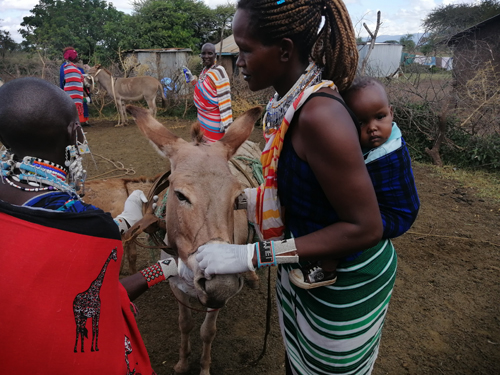
Naomi Sokoine and Mama Lemaiyan Prep their Donkey For Deworming During this Year's National Donkey Day Celebrations in Olmapinu, Rombo in Kajiado County. The sleepy, dry, and dusty village of Olmapinu, in Rombo – Kajiado County came to life on 17th of May 2021, as local women came in droves, accompanied by their donkeys, and gathered at Mama Lemaiyan’s donkeys’ watering point where this year’s National Donkey Day in Kajiado County was marked. On the sidelines of the commemoration event, a mentorship exercise for 27 younger women by the older women on how to handle donkeys for maximum benefits was ongoing. Cynthia Lemaiyan, the Olmapinu Women Empowerment Forum representative reminded them that she was a product of donkey benefits. When her father died, her mother took them to school through the proceeds of donkeys hence encouraging all women to care for their donkeys to enjoy more benefits and improve their donkey-generated income. On this National Donkey Day – a day observed to create awareness on the welfare of donkeys and to also appreciate the importance of the animal in Kenya and its value to the many communities who depend on it for their livelihoods, ANAW collaborated with the Kajiado County Veterinary Department, in a county-driven donkey clinic that saw 72 donkeys vaccinated against rabies disease. The donkeys were also dewormed, and wound management administered to those with wounds occasioned by poor harnessing. Monkeys Treated and Released to the Wild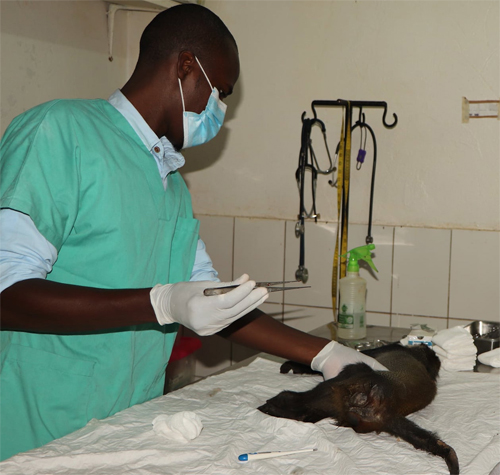
Dr Erick Onsongo, ANAW Veterinary Officer based in Colobus Conservation attends to a patient in the clinic. The month of May saw the Colobus Conservation Clinic attend to 14 welfare cases. Out of these, four were Sykes monkeys, five Angolan black-and-white Colobus, three Vervet monkeys, one bushbaby (Garnetii otolemur), and one yellow baboon. Consequently, one vervet monkey was entered into long term rehabilitation, two Sykes monkeys and one yellow baboon were treated and released back to the wild. Four Counties Practicing Battery Cage Poultry System Visited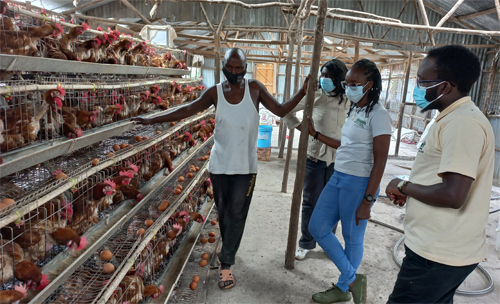
John Nyaga (in vest) takes ANAW team through a tour of his Battery Cage System facility. ANAW team implementing the Open Wing Alliance (OWA) supported project on Action Towards Cage-free Poultry Farming in Kenya visited four (Nairobi, Kiambu, Machakos and Kajiado) of the intended 15 counties, on a fact-finding mission to identify the current trends and drivers of caged poultry farming in the country. The team was able to ascertain that, indeed, these battery cages curtailed a myriad of natural behaviors for the birds; including nesting, perching, dustbathing, scratching, foraging, running, jumping, flying, stretching, wing-flapping, and even walking. Furthermore, the severe confinement restricted physical movement leading to metabolic disorders, including cage osteoporosis and liver damage. Interviews with different farmers within the four counties revealed adoption of battery cages as a means of poultry production in Kenya was increasingly gaining popularity among small-scale peri-urban and urban farmers. Further, some of the county veterinary officials spoken to, indicated that most battery cage suppliers and farmers were keen on profits and viewed animal welfare as a foreign concept. Wildlife Suffering by Wire Snares Continue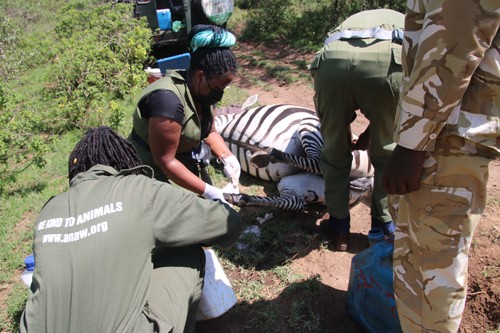
ANAW and KWS Wildlife Emergency Rescue team attend to a snared zebra in Nakuru County. In the month of May, ANAW rescue team in collaboration with the Kenya Wildlife Service (KWS) Veterinary Unit responded to nine (9) zebras in distress at different ranches in Nakuru County. One of the zebras was at Pepper Corn Farm that had a wire snare around its left forelimb that had eaten through the skin causing a large wound leading to severe lameness on that limb. Another one at Game Ranch and had tumorous growths on its right ear, left flank along with an old snare wound on the neck. The one at Manera farm and had a wire snare around the neck which was still attached to a log that the zebra kept dragging around. Other ranches where rescue was done included; Marula and Aquila Farm. All the nine zebras were treated successfully and are expected to make a full recovery. The ANAW Rescue team will continue to attend to these wildlife species in pain while at the same time encouraging the community members living close to these ranches and parks, to help conserve the animals for future generations by reporting suspected persons setting up snares or poaching for prosecution. Kenyan Court Rules in Favour of Donkey Slaughter.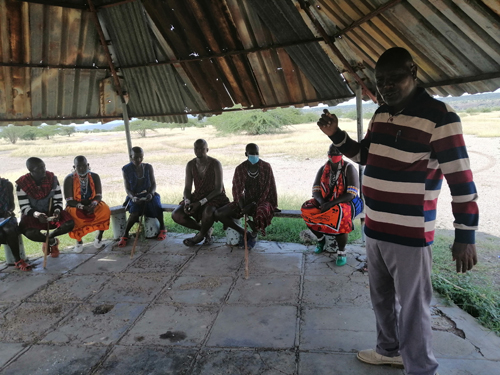
Chief Daniel Lonkoi Sensitise Magadi Donkey Owners Forum on the Need for More Vigilance on Donkey Cross-border Movement Following Kenya's Court Quashing of Legal Notice 63 of 2020. On the 4th of May 2021, a High Court Judge (Justice Richard Mwongo) in Naivasha –, Nakuru County invalidated a prohibition for the slaughter of donkeys after one of the Kenyan Donkey abattoirs (Star Brilliant) challenged the legal notice halting the slaughter of donkeys in Kenya, that had been effective since February 2020. The court indicated that the government did not sufficiently prove their case and hence giving the court grounds to quash the Legal Notice 63 of 2020, highlighting that it had violated the rights of Star Brilliant Slaughterhouse. The said abattoir had sought to bar Agriculture Cabinet Secretary Hon Peter Munya and Attorney General Mr. Kihara Kariuki from enforcing a legal notice that halted the slaughtering of donkeys in Kenya The ruling as it is, now grants the four donkey abattoirs in the country space and rights to legally resume their operations. We anticipate a possible influx of donkey movement along the borders being driven by high demand for donkeys by the abattoirs for slaughter. On the same breath, ANAW partnering with Welttierschutzgesellschaft e.V. (WTG) engaged the media to air out the communities’ displeasure and long-term implications of reopening the donkey slaughterhouses. The following are the links:
Increased Efforts to Halt Illegal Cross-border Donkey Trafficking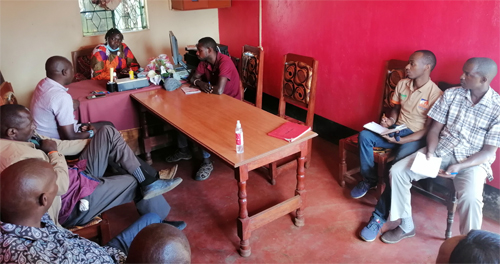
Rispher Kitunny - Assistant County Commissioner (ACC) in Rombo Moderating a Security Border Patrol Committee Meeting to Address Donkey Cross-border movement and Security Along Kenya-Tanzania Border in her Rombo office, Kajiado County. In the month of May, ANAW continued to implement the Brooke East Africa (EA) supported project aimed at building resilience and capacity for donkey owning communities and grassroot government officials to enhance vigilance and curtail theft and illegal movement of donkeys along the Kenya-Tanzania border. The project team conducted four information sharing and community education meetings in Olposimoru, Ololaimutia in Narok County as well as Magadi and Rombo in Kajiado County. The focus of the meetings was to highlight the continuity of the project as well as inform the community members on the reopening of the donkey abattoirs in the country for their vigilance. Similarly, four barazas (public gatherings) were also conducted in the above-mentioned four zones involving the respective chiefs and Nyumba Kumi (village elders) representatives encouraging them to come up with clear measures to curtail potential theft and illegal smuggling of donkeys following the reopening of the slaughterhouses. Administration Chiefs indicated that they had already formed local cultural tribunals with hefty penalties on anyone found stealing a donkey, to curb future donkey theft. Importantly, a consultative meeting was conducted with the Security Border Patrol Committee based in Rombo. Members gave various suggestions on how to halt the illegal smuggling of donkeys from Tanzania. The National Border Patrol Unit conducts daily patrols from Taita Taveta up to Namanga Border Post with their officers posted along different stations along the porous lengthy stretch. During the successful meeting, they all committed to be on the lookout on any illegal donkey crossing the border and inform the Deputy County Commissioner based in Rombo for immediate action. The committee is comprised of the Deputy County Commissioner, area chiefs, Rombo Ranch leaders, local police, and the national border patrol unit. Consequently, Voice of America aired two stories to keep the conversation going on, not only in Kenya but also beyond the borders. Here are the links;
Support Our Work Here's a great way to support Africa Network for Animal Welfare (ANAW) and enable us to protect future generations of animals. You can do so through the following ways: Leave a Legacy in Your Will Through Donation Click on this link to donate: https://bit.ly/3xrwQxI. |
